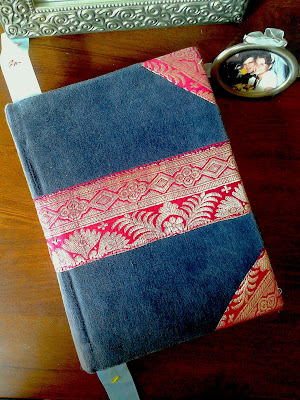For those of us living the writing life, whether we realize it or not, we are constantly learning as we read. Often I'll find myself engrossed in a book where the author's voice becomes so familiar I swear I'll never forget its rhythms and style. And while I sometimes can hold onto a general sense of these things, I'm finding I need to be more intentional with my reading if I want these impressions to last.
This year I've started using my commonplace book as a place to record quotes that have struck me as important. Sometimes it's a fresh simile, other times just a sentence to remember the atmosphere an author has so wonderfully invoked. I've recorded the last few pages of novels, those key moments when everything comes together. I've written down scenes when the protagonist reaches the end of his or her self and must become something new.
It's in looking for and taking note of things that I'm learning to grow as a writer.
Here are a few similes and metaphors I've collected these last few months from middle grade, young adult, and adult titles:
"Alice's stomach was rumbling like an empty garbage can rolling down a hill..." PIE, Sarah Weeks
"I try to stuff myself between the seats, like coins." EMILY'S DRESS AND OTHER MISSING THINGS, Kathryn Burak
"Majid had a family network as complex and secretive as a walnut shell." THE RUINS OF US, Keija Parssinen
"Her voice sounds as hollow as the empty wasp's nests." CROSSED, Ally Condie
"The day is collapsing into dusk. The Gypsies in their white shirts are the only lamps. The moon is coming in like a pan on fire." SMALL DAMAGES, Beth KephartAnd some darn beautiful truths:
"I lay my hand on my heart. Our parents teach us the very first things we learn. They teach us about hearts. What if I could be treated as though I were small again? What if I were mothered all over again? Might I get my heart back?
My heart is unfolding." CHIME, Franny Billingsley
"That taste is still in my mouth. I know what it is. It's the taste of pretending. It's the taste of lying. It's the taste of a game that is over." LIAR AND SPY, Rebecca Stead
"In spring, Amherst changes into a storybook. The students grow wings from their heels and run through town spinning and singing. You get the idea that some parts of life are pure happiness, as least for a while. The toy store in the center of town puts all its kites outside, on display, so that the tails and whirligigs can illustrate the wind." EMILY'S DRESS AND OTHER MISSING THINGS, Kathryn BurakWhat helps you process what you learn as you read?


Caroline, I love this idea! I've been starting to notice favorite lines for my MMGM posts and this idea of writing more of them in my notebook to learn from would be a natural continuation of that. Thank you!
ReplyDeleteYou're welcome! I hope it's a technique that makes them stick. ;)
DeleteI can speed read, but I choose to read as if I'm reading aloud and just sometimes read aloud. It helps me absorb what I'm reading. Roll around each word and see how they feel on my tongue.
ReplyDeleteYes -- like hearing words aloud helps us to somehow hold onto them better.
DeleteI do this exact thing! (Maybe it's the INFJ coming out? ;)
ReplyDeleteYes, ma'am. Introverts unite!
DeleteThanks for the reminder to slow down and smell the syllables!
ReplyDeleteBeth Kephart: LOVE!
Your handwriting is very nice!
Love this, Michael. I love Beth, too. She's an amazing author and just as amazing person. I'm usually a mess, writing-wise (ask my family and former students), so this is quite the compliment.
DeleteOh borrowing lines from books that you read is one of the best ways to find your own voice, I think. After a while, it all meshes together into your own style.
ReplyDeleteWriting things down further cements things. It's like all that spelling word practice from childhood: somehow taking the time to copy down words and phrases makes them our own.
DeleteI do this with my phone, because my handwriting is terrible.
ReplyDeleteAnd you've selected some gorgeous examples here, Caroline!
Smart thinking!
DeleteWhat can I say? I like words. :)
I love the commonplace book, Caroline. My husband keeps one. I, on the otherhand, have tiny pieces of paper, receipts, scraps, envelopes written in crayon, marker, eye pencil...yes, a book. I do, also, find that I am wary of what I read when I am writing. But that's another story...
ReplyDeleteeden
I just read an interview with adult author Jim Fergus, who doesn't really read anything while he's writing. I can't wholly relate to that, but there are certain books I avoid while drafting: those on similar subjects or the same historical era are really hard for me to read while writing. I feel like I'll somehow soak in and claim as mine something these stories have already done.
DeleteI like to enjoy reading a book just for the pleasure of it, and I don't start thinking about the book as writer until after I finish. So I put a sticky note in the inside of the book and write down page numbers of sentences, scenes, etc. that really strike me as powerful so I can consider it later.
ReplyDeleteNice! I often tear my scrap-of-paper bookmark into smaller and smaller pieces to mark passages I like. Then I have to go back through and hunt them down, but it's very rare I don't find exactly what I intended to mark. Somehow those same phrases jump out at me as important.
Delete